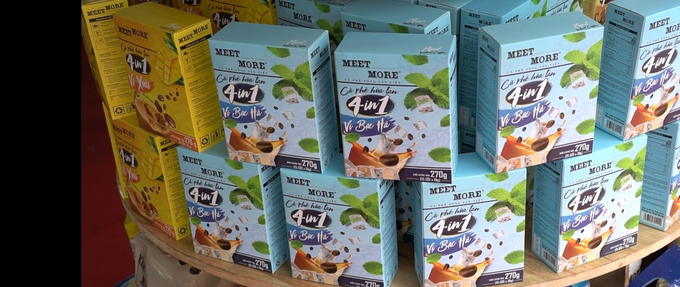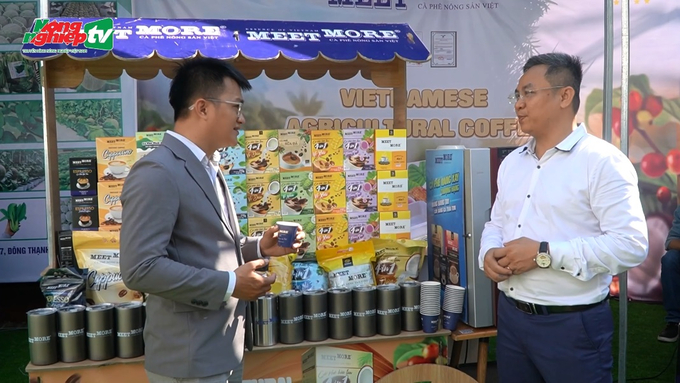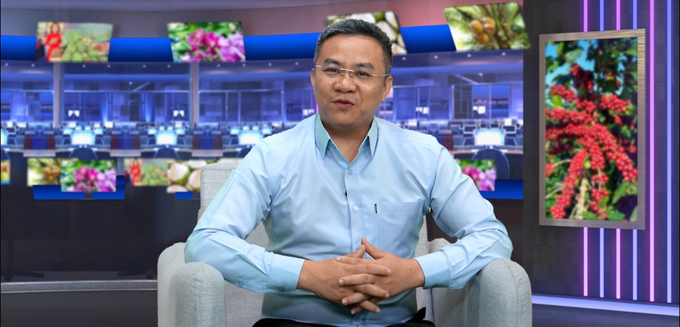December 11, 2025 | 16:53 GMT +7
December 11, 2025 | 16:53 GMT +7
Hotline: 0913.378.918
December 11, 2025 | 16:53 GMT +7
Hotline: 0913.378.918

Instant agricultural coffee of Meet More Coffee. Photo: VAN.
In recent times, there are some exported OCOP products that have been mentioned a lot, such as Meet More Coffee's instant agricultural coffee, Viet Nature's vegetable powder products, Tai Hoan arrowroot vermicelli, and Tan Nhien rice paper.
To better understand the product development orientation of businesses with OCOP-certified products, Vietnam Agriculture Newspapers also had an interview with Mr. Nguyen Ngoc Luan, CEO of Meet More Coffee Global Trading Connection Co., Ltd.
Sir, at Meet More Coffee, how is the story of developing OCOP-certified products oriented?
For Meet More, right from the product development orientation, we set our sights on the export market and then return to the Vietnamese market after 3 years of exporting. And fortunately, since we returned to the Vietnamese market in 2023, we have also been able to achieve some certifications, and Meet More's products were also assessed as 4-star OCOP by the Council.
Through the 4-star OCOP program, we have many benefits and advantages. We can access the domestic market faster. Domestic retail systems such as supermarkets will also have plans to support OCOP products and businesses with OCOP products. Domestic media also introduces information to people. These are areas where businesses will benefit and receive support from the government.

Meet More returned to the Vietnamese market in 2023. Photo: VAN.
As you shared, Meet More follows the direction of going to the world first and then returning to the Vietnamese market. So can you share more of your experiences in the world market with a purely Vietnamese product, sir?
As we know, for many years, Vietnamese products exported to the world have not gained a foothold and are being thought by foreign consumers to be of low quality. Or some things our businesses do are not good or do not meet standards, leading to the reputation of the Vietnamese brand in the world market not being high. That's why we were determined to build a product with a Vietnamese brand for the community of Vietnamese expatriates in the world.
We wish them to change their thinking that our Vietnamese products are no longer the same as in the past. This is the difficulty we identified at the beginning. However, unexpectedly, within 2 years, when we exported to countries with large Vietnamese communities around the world, such as the US and Australia, we received their high response because Vietnamese people have an extremely high pride in Vietnamese blood for products produced by Vietnamese people. Thereby, our products have gradually won the trust of our Vietnamese expatriates, from whom they themselves are messengers to help Vietnamese products spread more widely.
For foreign indigenous people, when living in the same environment as Vietnamese people, they will also pay attention to what products Vietnamese people use, what they eat, and what they drink. Supermarkets also see that for such a community there is still a need for any product, and they will call us or we will offer the product and start receiving criteria and standards from them. If we can meet those requirements, we will enter the market. These are some experiences that we think are easier to implement for the export market than the brand market in Vietnam.

Mr. Nguyen Ngoc Luan, CEO of Meet More Coffee. Photo: VAN.
Returning to the story that after achieving certain success in the international market, you returned to the Vietnamese market in 2023 and also achieved some certifications in the Vietnamese market, including OCOP. So, since you received OCOP certification, has there been any change in the story of bringing products to the international market, sir?
Regarding change, I think there has been no change. Because Vietnam's criteria and standards are not well known to the world. Meanwhile, the products are exported, which means that the criteria of products achieving good quality and following importers' criteria have been met. As for some standards on food safety and hygiene, HACCP or ISO, they are mandatory and necessary standards for products in the business.
Regarding OCOP, in fact, very few people in our country know about OCOP, so foreign countries certainly do not know much about it either. Because of that factor, we have to find a way to introduce products to people and consumers. For products, in addition to being unique, new, and quality, we must have some keys and ways to market and introduce to people, which is the difference. Because if we just talk about coffee in general, people will compare our product with big brands. If so, we definitely cannot be chosen.
Thank you, sir!
Translated by Thu Huyen

(VAN) The purpose of this visit is to unify the proposal for a technical assistance project supporting sustainable agricultural and forestry development in Angola.
![Unlocking carbon credit potential: [3] New direction for rice production](https://t.ex-cdn.com/nongnghiepmoitruong.vn/608w/files/huyenvt (e)/2025/12/10/3428-2-092319_209.jpg)
(VAN) Low-carbon rice models in Thanh Hoa are opening up opportunities for a green, circular agriculture, aiming at carbon credit generation.
![Unlocking carbon credit potential: [2] Story of Pu Hu forest](https://t.ex-cdn.com/nongnghiepmoitruong.vn/608w/files/huyenvt (e)/2025/12/09/3813-2-171042_611.jpg)
(VAN) Revenue from emission reductions has brought major changes to the Pu Hu Nature Reserve, from improving community livelihoods to strengthening linkages for sustainable forest management.
![Unlocking carbon credit potential: [1] Toward a green economy](https://t.ex-cdn.com/nongnghiepmoitruong.vn/608w/files/huyenvt (e)/2025/12/09/1340-2-130237_804.jpg)
(VAN) Thanh Hoa is advancing the development of carbon credits from forests and agriculture, generating sustainable income, improving livelihoods, and moving toward a green and low-emission economy.

(VAN) After three years, Project FST/2020/123 collected approximately 3,000 insect specimens, classified them into about 50 morphological groups, and identified around 40 species, including several new species.
/2025/12/01/0509-2-175427_206.jpg)
(VAN) Emission-reducing coffee areas in Lam Dong have entered the new crop with stable yields, improved quality, and a remarkably enhanced cultivation environment.

(VAN) The Institute of Agricultural Sciences for Southern Vietnam (IAS) marked its 100th anniversary in Ho Chi Minh City, celebrating a century of growth as a leading institute contributing significantly to Viet Nam’s agricultural development.